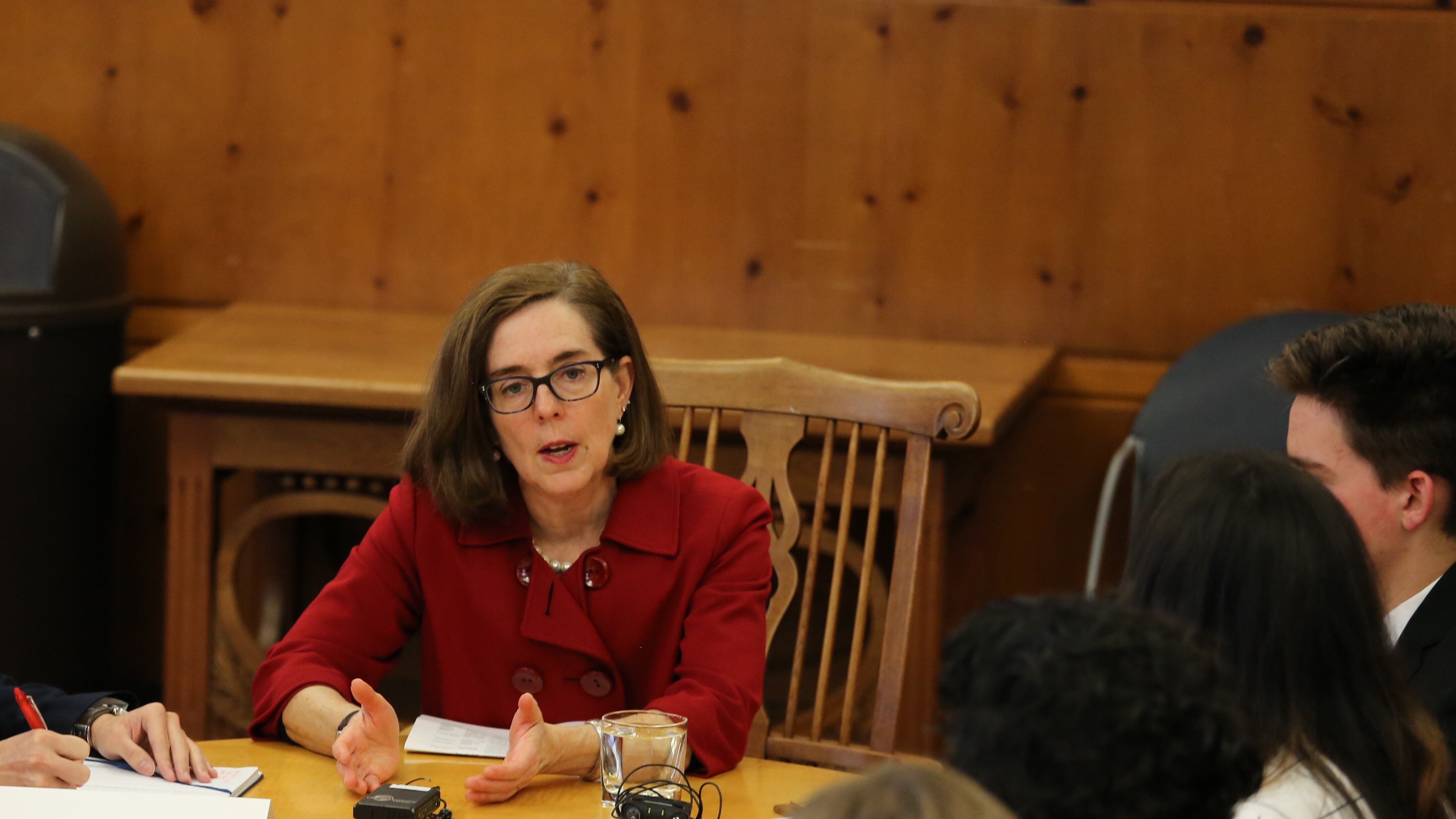Gov. Kate Brown this week pledged to launch an investigation into the state's economic development agency, Business Oregon. The move follows a letter from a dozen current and even more former employees who describe toxic working conditions.
"We are reaching out to you to make a formal complaint regarding a series of allegations: discriminatory practices toward senior career employees, women, budgetary and program abuses and a hostile work environment," says an April 5 letter to Brown.
The allegations center on the agency's director, Chris Harder, whom Brown hired in March 2016 from the Portland Development Commission. Harder's critics, who are anonymous, say in their letter to the governor that the agency shifted under Harder's leadership to "encouraging a young/male 'bro club' environment."
Brown, a former juvenile and family lawyer who has made equal rights a central focus of her political career, now faces a difficult decision in an election year. She must decide whether to be loyal to one her highest-profile hires, or respond to two of her key constituencies: women and seniors.
"Gov. Brown takes the concerns of these employees seriously, and upon receiving the letter, both the governor's office and Business Oregon leadership asked for an investigation to begin as soon as possible," said Brown spokesman Bryan Hockaday. "An investigator has been retained and will begin looking into the claims next week."

Officially called the Oregon Business Development Department, Business Oregon has relatively few employees (about 140) but wields an outsized prominence because it distributes lucrative grants, loans and tax breaks.
Business Oregon will spend just over $821 million in the 2017-19 budget cycle, much of that on infrastructure projects. The agency runs the state's strategic investment program, which has provided Intel and other companies with hundreds of millions of dollars in property tax breaks, and enterprise zones, which also include another category of corporate property tax breaks.
The agency also oversees the Oregon Growth Board, which has invested $150 million in Oregon companies. It serves as the fiscal agent for the Oregon Film and Video Commission, which uses tax credits to encourage Hollywood productions to shoot in Oregon. And it runs the governor's strategic reserve fund, which offers discretionary financial support to businesses.
Under Harder's leadership, the agency recently completed a new strategic plan that envisions a leaner agency focused on aiding small businesses and stabilizing rural Oregon. The transition, according to the letter employees presented to Brown, has been rocky.
"We have experienced the highest employee turnover in our history due to the caustic work environment and blatant discriminatory behaviors and practices," the letter says. "In the past 24 months, more than 27 career employees have left the agency."
The complainants say Harder and his team were particularly tough on women and older employees.
"Men and younger staff had been promoted, coached, assisted or given alternative internal job opportunities," their letter says. "Management has undermined female employees' authority…and pregnant women or new mothers experienced lost promotional opportunities. All have exited the agency."
In a statement, Harder defended his management of Business Oregon and noted his leadership team is evenly split between men and women and, overall, 53 percent of the agency's employees are female.
"I was surprised and disheartened at the issues raised," Harder said. "Our leadership team takes the concerns raised very seriously, as any organization should. We immediately began working with the governor's office to look into the issues raised. We look forward to any advice an outside investigator may have about what, if any, changes should be made."
Interviewed on background, some of the Business Oregon critics cited specific concerns about how agency performance has shifted:
• They say Business Oregon is increasingly reliant on expensive consultants who appear to be hired and compensated outside of established practices.
• They question whether money has been improperly diverted from strategic reserve funds to the Oregon Growth Board.
• They say criteria for strategic growth fund investments have been relaxed and the agency rushed to make a disproportionate number of investments at the end of fiscal 2017.
The agency declined to respond to specific accusations until the investigation is complete.
The agency's own data reveals some signs of stress. Business Oregon fell nearly 30 percent short of its job creation goals for 2016 and 2017, for instance, after exceeding those goals in each of the two previous years. Similarly, the agency reported that customer satisfaction, as measured by a survey of 3,900 customers, fell sharply below agency goals in the past two years, after regularly meeting those goals.
The complainants have hired Dana Sullivan, an employment lawyer. In her own separate letter to Brown, Sullivan said agency staffers had brought their concerns to management but were rebuffed.
"Several employees have addressed these issues internally with agency managers," Sullivan wrote. "Those who have spoken up have been subject to retaliation, resulting in a complete absence of trust that internal complaints will lead to any examination of the agency's practice."
Sullivan provided WW details of nearly two dozen instances in which employees say they brought specific concerns to management over the past two years. She says her clients want the agency to take "concrete steps" to fix the problems. Otherwise, they may sue.
Harder said his agency welcomes the investigation.
"We held an all-staff meeting last week where I informed the agency that concerns had been raised and that we were working with the governor's office as they bring in an outside party to help us look into those concerns," he said. "I encouraged staff to be forthcoming, cooperative and candid."
Sullivan says she had not been informed Business Oregon will conduct an investigation.
In the past, Sullivan has regularly represented public employees, but she says this case is different.
"It is not uncommon to see individual allegations of sex or age discrimination asserted by state employees," Sullivan says. "What is uncommon is the allegation of a pattern and practice of discrimination, such as the one my clients and other employees have experienced at Business Oregon."
